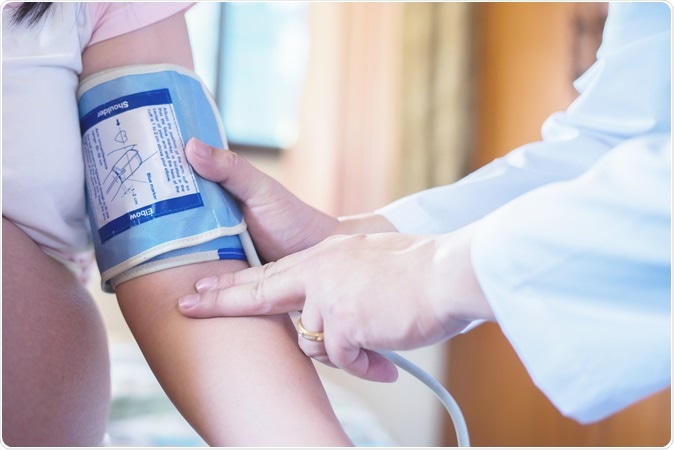A new study has found that young women who have high blood pressure before their pregnancy are at a greater risk of suffering from a miscarriage. This is true for women who have not been diagnosed with hypertension but have an elevated blood pressure. The study was conducted at the Eunice Kennedy Shriver National Institute of Child Health and Human Development (NICHD) and is due to appear in the May 2018 issue of the journal Hypertension.

Image Credit: Have a nice day Photo / Shutterstock
The researchers found that increase in the diastolic blood pressure is significantly associated with pregnancy loss. Blood pressure is depicted in two numbers 120/80 mm of Hg. The upper number is systolic and the lower number is diastolic blood pressure. Systolic pressure is the pressure exerted on the walls of the artery when the heart pumps out the blood and diastolic pressure is the pressure on the walls between two heart beats. Mena arterial blood pressure is the average pressure on the arterial walls during the whole heart beat cycle. For every 10 unit rise of the diastolic blood pressure, the risk of loss of pregnancy rises by 18 percent they note. They added that for every 10 unit rise in mean arterial blood pressure, the risk of miscarriage rises by 17 percent.
According to senior author Enrique Schisterman, chief of epidemiology for the U.S. National Institute of Child Health and Human Development, or NICHHD, this is a “unique” study because it has always been known what high blood pressure during pregnancy can do to the fetal health. That blood pressure before pregnancy can also affect the pregnancy adversely has been shown for the first time. This was an association that they noted rather than a direct causal risk he said.
For this study the team of researchers looked at 1,228 women who had lost one or two pregnancies to a miscarriage. They were all trying to get pregnant again. These women were actually taking part in a clinical trial (Effects of Aspirin in Gestation and Reproduction (EAGeR) trial) where they were given low dose Aspirin (81 mg) to reduce their risk of miscarriage. Their blood pressures were measured once while they were trying to get pregnant and then again during their early pregnancies. Of all the women, 797 women conceived within six months. Around a quarter of these women suffered a miscarriage. The researchers noted that there was an association between these pregnancy losses and pre-pregnancy elevated blood pressures. Schisterman said blood pressure seems to affect the pregnancy at each stage but the more elevated it is, the worse the risk.
Lead researcher Carrie Nobles, a post doctoral fellow with the NICHHD added that the study does not say that higher systolic blood pressure does not affect the pregnancy outcome. Nobles said diastolic blood pressure is a better indicator of future possibility of heart disease compared to systolic pressure in younger adults who are in their 20s or 30s. In older adults, Nobles explained, the risk is reversed. Schisterman added that it could be the high blood pressure or even the other health markers such as obesity and diabetes that could be playing a role in raising pregnancy loss risk.
According to experts, all women who are trying to get pregnant should get their blood pressures checked and keep it under control to ensure a safer pregnancy. This could be achieved with a healthy diet, weight control, regular exercise and in general a healthy lifestyle.
References